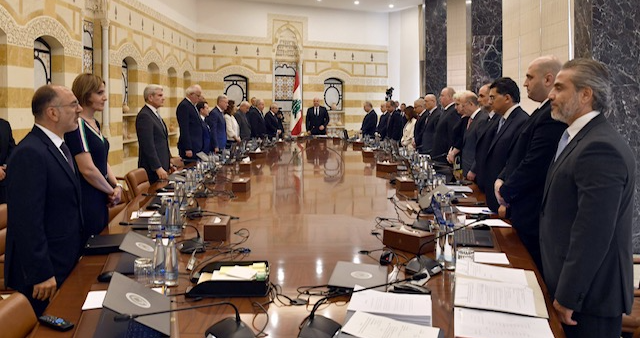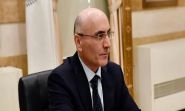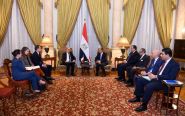
In a series of wide-ranging decisions on Wednesday, the Council of Ministers appointed Mohammed Kabbani as the new head of the Council for Development and Reconstruction (CDR), marking a key shift in the leadership of one of the country’s most pivotal public institutions.
During the session chaired by President Joseph Aoun in Baabda’s presidential palace, the cabinet also approved the extension of the mandate for the United Nations Interim Force in Lebanon (UNIFIL), affirming Lebanon’s continued cooperation with the international peacekeeping mission in the south.
Information Minister Paul Morcos, speaking after the session, detailed the decisions, confirming that the cabinet decided to place North Lebanon Governor Ramzi Nohra at the disposal of the Minister of Interior, a step that often signals a reassessment of responsibilities or, less likely, potential reshuffling within the civil service.
Morcos said that the cabinet had also endorsed a request by the Ministry of Labor to assess the financial contributions owed by journalists to the National Social Security Fund (NSSF).
On the educational front, the government approved a proposal from the Ministry of Education to allow Lebanese students who studied abroad, including in Syria and other countries, as well as Syrian and foreign students, to register for Lebanon’s 2025 official exams, provided they meet specific conditions.
Additionally, the cabinet granted the High Relief Commission permission to amend the allocation of a treasury advance, issued under Decree No. 14056, to redirect funds toward shelter allowances.
President Aoun and the Pope’s inauguration
At the outset of a cabinet session, the President of the Republic called for a minute of silence in honor of the late former Minister Adnan Al-Qassar. He then congratulated Pope Leo XIV on his election, announcing his participation in the Pope’s inauguration in the Vatican on Sunday.
The President then emphasized the strength of Lebanon’s ties with Gulf nations, citing pride expressed by these countries in Lebanese expatriates. He warned against the internal discord and lack of national responsibility that contrast with the goodwill Lebanon receives abroad. Notably, he highlighted a recent call with Kuwaiti Crown Prince Sheikh Sabah Khaled Al-Hamad Al-Mubarak Al-Sabah regarding energy cooperation, praising Kuwait’s swift and positive response.
President Aoun also mentioned a statement by the Kuwaiti Minister of Interior, who conveyed to Emir Sheikh Meshaal Al-Ahmad Al-Jaber Al-Sabah that the Lebanese community in Kuwait is peaceful and productive—a sentiment Aoun described as both a source of pride and a call to action. Stressing urgency, he urged Lebanese officials to break from political deadlock and seize regional goodwill.
He confirmed that Prime Minister Nawaf Salam will represent Lebanon at the upcoming Arab Summit in Baghdad due to the President’s own travel to the Vatican. Aoun also revealed plans for an official visit to Iraq, expressing gratitude for Iraq’s support to Lebanon.
Addressing regional developments, Aoun welcomed the UAE’s decision to lift the travel ban on Lebanon and condemned Lebanese media attacks on Gulf countries, calling for legal measures to prevent such actions. He warned that these attacks harm Lebanon’s foreign relations and vowed to work with the Minister of Justice to safeguard diplomatic ties while respecting media freedom.
On domestic issues, the President praised improvements at Beirut International Airport (BIA) and ongoing infrastructure projects. He also denounced recent Israeli aggression on Lebanese territory, stating that diplomatic efforts are underway to ensure Israel abides by the ceasefire agreement.
In electoral matters, Aoun commended the completion of the municipal elections in Mount Lebanon, North, and Akkar governorates, and praised the efforts of security and judicial bodies in ensuring transparency. He acknowledged incidents of bribery but assured the public that they were dealt with decisively.
Then, Prime Minister Salam underscored in his remarks, the potential benefits of the U.S. lifting sanctions on Syria, including the facilitation of refugee return, regional energy cooperation, and investment opportunities for Lebanon. He echoed the President’s commendation of airport improvements and called for bolstering Lebanon’s export sector and expediting the import of scanning equipment.
For his part, Minister of Public Works, Fayez Rasamni, highlighted logistical and financial hurdles impeding progress at the airport but confirmed ongoing work by the government’s reconstruction committee.
Meanwhile, Interior Minister Ahmad Hajjar addressed challenges during the second round of elections and reaffirmed the integrity of the results, pledging further measures to ensure transparent processes moving forward.




Comments